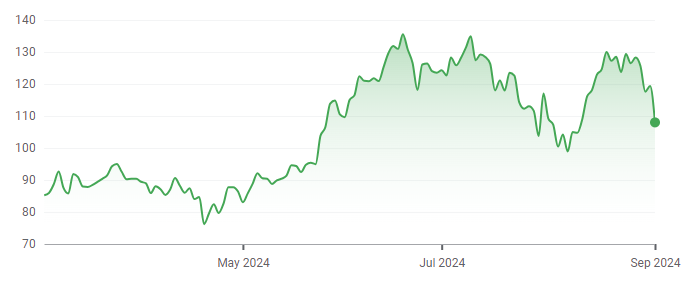Investors had grown accustomed to watching Nvidia’s shares climb relentlessly upwards but their faith in the chip designer has been rattled in recent weeks. Yesterday Nvidia’s share price plunged by 9.5% amidst a broader sell off in the S&P 500, which fell 2.1%. The Philadelphia Semiconductor index was hot on Nvidia’s heels, falling 7.8%.
Simon Evan-Cook, a multi-asset fund-of-funds manager at Downing, was relieved to see the stock market darling coming off the boil. “I’m over the moon because Nvidia has just been such a pain in the neck for active fund managers,” he said.
Many active managers have produced decent returns over the past year but their performance has been “eclipsed” by Nvidia, which is “in the heart of a frenzy”, he said.
Its share price has risen 122.5% in the year ending 3 September 2024, compared to 22.4% for the average fund in the IA North America sector in dollar terms.
Even the best performing fund in the sector over one year – Alger US Equity – was far behind Nvidia, returning 37.6% in dollar terms (or 32.1% in sterling). “It can make you look very pedestrian,” Evan-Cook complained.
Yet the chip maker’s fortunes have reversed of late and the stock has been volatile for the past two months. Nvidia’s share price fell from $135 on 10 July 2024 to $99 on 2 August before recovering to $130 on 19 August, only to drop off sharply to $108 yesterday, as the chart below shows.
Nvidia’s share price over 6 months

Source: Google Finance
US and global equity indices have become “unbelievably volatile” because they are being driven – and, at times, dragged down – by mega-cap technology stocks, which are absorbing a large proportion of investors’ money and focus, Evan-Cook continued.
Investors may be concerned that global and US equity markets are expensive as well as volatile, and that is true, he said. Instead, he believes investors and fund managers should look within markets.
“When you get away from the mega-caps there are so many amazing opportunities,” he said, such as small and mid-cap stocks in the UK, US and Japan. “Most stocks in the market are very good investments but the market itself is not a good investment because it is dominated by mega-caps.”
Although technology will undoubtedly continue to be a key part of the global economy, the sector looks expensive and faces risks such as anti-trust regulation, he said.
Furthermore, Evan-Cook thinks the global economy is on the cusp of a commodity super-cycle driven by decarbonisation. The world will need more steel to build windfarms and renewable energy infrastructure, so he expects commodities to attract more of investors’ attention.
Looking back over decades, “the pendulum does seem to swing from commodities to tech then from tech to commodities,” he observed. For instance, back in 2010 and 2011, technology was considered boring, Microsoft was part of the value index and the world’s biggest company was oil major ExxonMobil.
Evan-Cook said that if he was a top-down thematic investor, he would favour the UK stock market over the US going forward because it is cheaper and contains more commodities. In contrast to the growth-oriented, tech-heavy US, the UK’s FTSE 100 is “a real value index”, full of commodities and banks.





